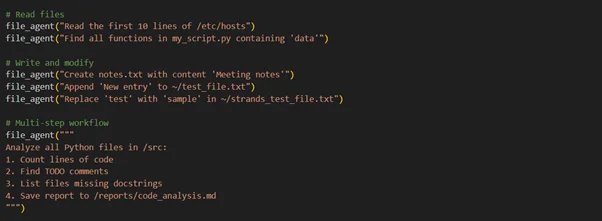|
Voiced by Amazon Polly |
Introduction
File management has traditionally required command-line expertise and complex scripting. Whether configuring servers, processing data, or maintaining codebases, these operations often involve memorizing commands and building automation.
Strands changes this paradigm by introducing AI-powered natural language file management. Instead of remembering obscure flags or writing scripts, tell the agent what you want to do. The result is a safer, more intuitive, and more accessible way to manage files, without sacrificing precision or reliability.
Pioneers in Cloud Consulting & Migration Services
- Reduced infrastructural costs
- Accelerated application deployment
Strands
Strands is an AI agent framework that turns natural language instructions into precise technical actions. Combining intent understanding with specialized tools allows developers and teams to perform file operations in plain English while the agent handles execution.
Core Components
- Agent Framework – Central intelligence coordinating tools and interpreting requests.
- Natural Language Processing – Understands complex, multi-step file tasks.
- Tool Integration – Built-in support for reading, writing, and editing files.
- Safety Features – Validation, permission checks, error handling, and confirmations.
Example: Creating a File Agent

Natural Language in Action

Key Features
- Intelligent File Reading
Strands agents understand context and choose the best way to read files. They can display entire contents with statistics, retrieve specific line ranges, search for patterns, or summarize file metrics. For example, you could ask, “Show me lines 10–20 of server.log” or “Find all lines containing ‘error’.”
- Safe and Flexible File Writing
File writing is designed with built-in safety. Agents can create new files, append to existing ones, or overwrite only after confirmation. Atomic updates ensure operations are completed fully or rolled back, protecting against corruption. This makes them reliable for sensitive environments like production servers.
- Advanced Editing Capabilities
The editor tool goes beyond simple search-and-replace. It performs context-aware edits that respect structure and syntax. You can insert lines at specific points, update configuration parameters consistently across files, or apply bulk edits while maintaining formatting.
- Natural Language Understanding
The most powerful capability lies in natural language processing. Strands can execute multi-step workflows from a single instruction, maintain context between requests, and provide clear confirmations. If something fails, it explains why and suggests alternatives, reducing the guesswork common in manual file operations.
Use Cases
- DevOps Configuration Management – Modern infrastructures rely on hundreds of configuration files across multiple environments. Strands simplifies this by understanding dependencies and relationships. For example, when updating database connection strings, the agent can automatically locate affected files, apply consistent updates, and validate syntax, reducing deployment risks.
- Data Engineering and ETL Workflows – Data pipelines involve scripts, schemas, and logs that need frequent updates. Strands agents act as intelligent stewards by detecting schema drift, adjusting transformation logic, and maintaining data lineage documentation. This ensures data pipelines evolve smoothly with changing business requirements.
- Software Development and Code Maintenance – Large codebases often undergo refactoring and modernization. Strands can help by replacing deprecated APIs across files, ensuring coding standards, and synchronizing documentation with code changes. It reduces manual effort while maintaining consistency at scale.
- Log Analysis and System Monitoring – Logs are critical for identifying system issues, but their volume makes manual analysis impractical. Strands agents can process real-time logs, search for error patterns, correlate events, and generate monitoring reports. This shifts log analysis from reactive troubleshooting to proactive system management.
- Documentation and Knowledge Management – Keeping documentation current is a persistent challenge. Strands can automatically extract information from comments, generate API docs, maintain change logs, and enforce consistent formatting across files. This ensures documentation reflects reality without manual upkeep.
Conclusion
Strands ushers in a new era of file management by combining AI-powered natural language understanding with robust file-handling capabilities, transforming technical operations into simple conversations while ensuring accuracy, precision, and safety.
This shift makes file operations more approachable for beginners, reduces the likelihood of errors in production environments, and allows technical experts to dedicate more time to higher-value initiatives. For DevOps teams, data engineers, software developers, and system administrators, Strands is an intelligent assistant that simplifies repetitive tasks, streamlines complex workflows, and boosts operational efficiency across organizations.
Drop a query if you have any questions regarding Strands and we will get back to you quickly.
Empowering organizations to become ‘data driven’ enterprises with our Cloud experts.
- Reduced infrastructure costs
- Timely data-driven decisions
About CloudThat
CloudThat is an award-winning company and the first in India to offer cloud training and consulting services worldwide. As a Microsoft Solutions Partner, AWS Advanced Tier Training Partner, and Google Cloud Platform Partner, CloudThat has empowered over 850,000 professionals through 600+ cloud certifications winning global recognition for its training excellence including 20 MCT Trainers in Microsoft’s Global Top 100 and an impressive 12 awards in the last 8 years. CloudThat specializes in Cloud Migration, Data Platforms, DevOps, IoT, and cutting-edge technologies like Gen AI & AI/ML. It has delivered over 500 consulting projects for 250+ organizations in 30+ countries as it continues to empower professionals and enterprises to thrive in the digital-first world.
FAQs
1. What file types are supported?
ANS: – Strands works seamlessly with most text-based formats, including configuration files such as JSON, YAML, XML, and INI; source code files like Python, JavaScript, and Java; and data formats like CSV, TSV, and logs. It also supports documentation formats like Markdown, plain text, and HTML, making it valuable across development, data engineering, and documentation workflows. While primarily optimized for text, Strands can also read and analyze binary files, for example, to extract metadata or perform integrity checks. However, direct editing of binary content is intentionally not supported for safety.
2. Can Strands handle large files?
ANS: – Yes. It supports chunked reading, selective processing, and streaming to avoid memory issues. This is especially useful for large logs and data exports.
3. Are file operations secure with Strands?
ANS: – Yes. Strands runs with the same permissions as the user and adds multiple safety layers. It validates paths, checks permissions, and can enforce restricted access in production. For sensitive operations, it requires explicit confirmation.

WRITTEN BY Livi Johari
Livi Johari is a Research Associate at CloudThat with a keen interest in Data Science, Artificial Intelligence (AI), and the Internet of Things (IoT). She is passionate about building intelligent, data-driven solutions that integrate AI with connected devices to enable smarter automation and real-time decision-making. In her free time, she enjoys learning new programming languages and exploring emerging technologies to stay current with the latest innovations in AI, data analytics, and AIoT ecosystems.


 Login
Login


 September 22, 2025
September 22, 2025 PREV
PREV











Comments